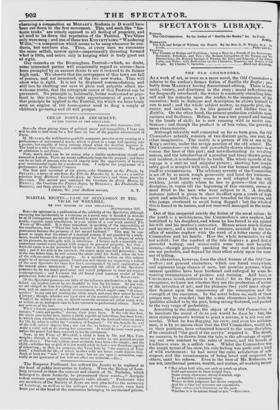MARITAL RIGHTS— CASE OF SUCCESSION IN THE VICAR OF WREXHILL.
TO THE EDITOR OF THE SPECTATOR.
19th September 1837.
Sta--As opinions in a publication of the celebrity of the Spectator, although occurring but incidentally in a Criticism on a novel, may it founded in mistake be of ill consequence, permit an old friend to point out an expression that, appa- rently, requires some elucidation, in your notice of a new work entitled The Vicar of Wrexhill. It is there remarked, in speaking of the impossibility of the conclusion, that "When the lady married again without a settlement, her possessions became the property of her second husband." This may be sup- posed to imply that the estate of a married woman, if not guarded by a settle- ment, would become the absolute property of her husband, to dispose of solely at his pleasure, by sale, gift, will, or otherwise. I believe such a miserable cir- cumstance cannot occur except with respect to personal property, but that a freehold estate is so far protected by law that a husband takes a life interest only ; and if his wife is the survivor, she comes again into full possession ; but if she dies before him, he still retains the estate until his death, when the heir of the wife succeeds to the property. As a mistaken notion on this subject might be of serious consequence, I trust you will excuse my requesting a corner of the next Spectator for these few lines, accompanied by your explanation of the remark above mentioned. I am persuaded the editor of the Spectator possesses by far too much good sense and sound judgment to treat my request contemptuously ; and I remain the old friend (and constant reader of that
publication from its first number) A SOLITAIRE.
[If the Spectator possesses one tithe of the influence attributed to it by our old friend, our readers cannot be too thankful to him fur his letter. At any rate, we are obliged to him for calling our attention to a brief generality of expres- sion, and an omission of minute circumstances, which might cause "ill conse- quences' to any one not reading the whole novel, and even then unless he were a lawyer ; though, whether our legal view of the marital rights of the Vicar of Wrexbill be correct or not, we should earnestly recommend either maid, wife, or widow, in an analogous case to have recourse to professional advice. Now to our notions of the law.
Winn a female possessing a freehold estate marries, the husband receives the
income, " rents and profits," during- their joint lives. If the wife dies first, the estate goes to her heir, unless a child, capable of inheriting, has been born in which case, whether it outlives the mother or not, the husband takes an estate for life, by what is called the "courtesy of England." Of this benefit tile will of the wife cannot deprive him ; nor can she, we believe, as a "feme covert" make a valid will at all, during her coverture. It would be mere waste paper, unless the power had been reserved to her by settlement. Now, in the Vicar of Wrexhill, a child is born to Mr. and Mrs. Cart- wright ; though it dies, (events too trivial to notice in our general account of the story). The lady's estate roust evidently have been a fee-simple; and the child—whether boy or girl, it is not worth while to look—was therefore capable of inheriting ; so that, we conceive, the Vicar had, by "the courtesy of Eng- land," a freehold for life, of which neither wills nor wives could deprive him. Such at least we "mute" to be the case: hut we are open t correction, espe- cially as our ignorance of law will not affect our criticisw.—Emj


























 Previous page
Previous page